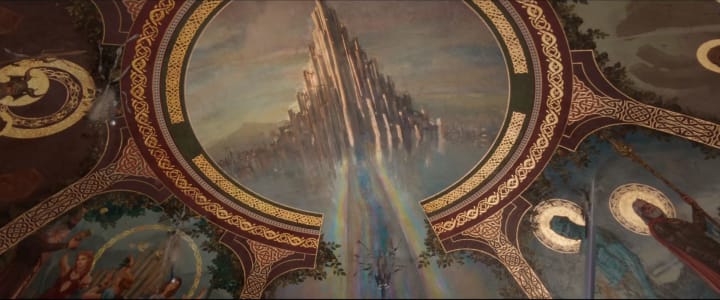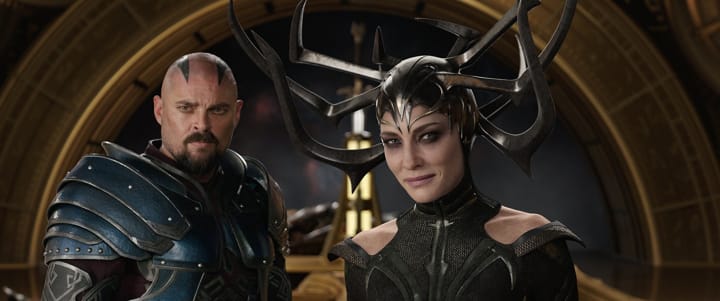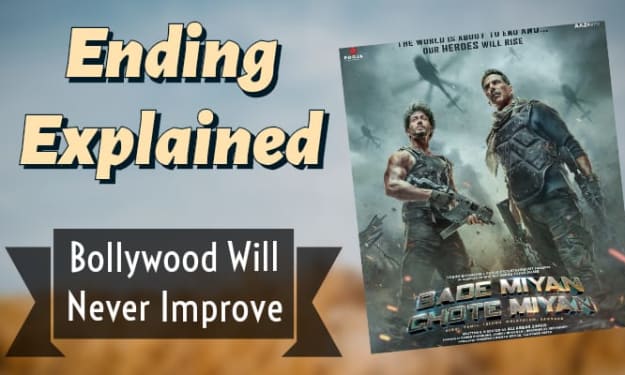5 Hidden Horrors of ‘Thor: Ragnarok’
We were a few laughs away from the MCU’s grittiest film.
In an unprecedented move, Marvel released three films in 2017, ending its run with Thor: Ragnarok. By now, everyone is aware of what a fun-fest Ragnarok is; in the hands of director Taika Waititi, jokes and gags take the place of broody rhetoric. The film effortlessly puts the ‘comic’ back in comic book adaptation, which has divided some fans due to the subject matter. Ragnarok is the Norse equivalent of the end of days and, irrespective of which era or version in Marvel comics history, has always been an epic and bloody changing of the guard.
So far, Ragnarok is killing it at the box office and initial concerns that Justice League will surpass its opening weekend numbers seem to be unfounded. But, while the film does not lack the requisite ingredients of epic battles, death, and a changing of guard, it buries much of its horror under humour and action — how successful that will be in the long-run remains to be seen.
As PB Shelley once wrote, "Our sweetest songs are those that tell of saddest thought." We take a look at five of this film’s darkest moments (Warning: Major Spoilers Ahead):
5. Asgard’s Imperial History

Shattering the history we know (Credit: Marvel Entertainment)
Over the past two Thor films, we have come to recognise Odin’s benevolence as a King, as well as his dislike for needless bloodshed. He readily casts out Thor when he leads an unprovoked attack on Jotunheim in the first film of the trilogy. Later, he rages against Loki’s nonchalance about the deaths in the Chitauri battle of New York. Loki is kept locked up and Odin doesn’t even allow him the opportunity to attend his mother, Frigga’s, funeral.
All this as he rules over the idyllic paradise that is Asgard. Little did we know that behind that façade lay millennia of deadly, imperial rule. As Hela takes over Asgard, she rips away Odin’s cosmetic cover-ups to reveal her family’s bloody history. Violence begot them the nine realms and the gold the first family adorned their palace with, yet Hela and Loki (and Thor) were all punished for acting on this instinct of theirs. The script touches on Odin’s hypocrisy, but doesn’t allow itself to strip Odin of the generosity that viewers have become used to over the course of the trilogy.
The true horror of this revelation is how it highlights the very real problem of history being re-written by victors, often by painting themselves in the best light. There is also the fact that even on Asgard, women get written out of history and their efforts are forgotten about completely.
4. Death of the Valkyrie
Partway through Ragnarok, Thor finds out that Scrapper 142 is a Valkyrie. He jumps to the conclusion that she must be a traitor to the cause, since she has been hiding out on Sakaar and not fighting to save Asgard. All of which is a worrying assumption. Thor is aware of the Valkyrie through childhood stories — he even wanted to be one before realising he is the wrong gender. But, later, when Loki uses his magic to access Valkyrie’s memories, we see her leading her troops to battle Hela. The Valkyrie were real and fought to stave off Hela’s reign years (centuries?) before Thor and Loki became warring princes. How come such an elite force was not resurrected or rebuilt? We hardly see any women warriors on Asgard (Lady Sif being the only obvious one), but not complete armies like the Valkyrie were. This, of course, comes down to the MCU’s continuity, hence the missing women, but in the context of the story, it seems like Odin banished any thought of the Valkyrie for one failed mission.
It might explain Valkyrie’s self-imposed exile on Sakaar, not only as a way to cope with centuries-long PTSD, but also because her regiment was unfairly disgraced. That is not how a warrior should live. In an effort to erase Asgard’s bloody history, Odin effectively wrote all women out of the history books; the woman at the forefront of the violence, Hela, and the valiant female-only army that fought her.
3. Massacre

Kneel for your queen (Credit: Marvel)
The moment Hela breaks free from her prison, she sets her sights on ruling Asgard. And she doesn’t take no for an answer. After successfully eliminating both Thor and Loki from the fight, she raises an undead army (and Fenrir, her giant pet dog), to quash any opposition. Given how few scenes Cate Blanchett is in, most of this quashing takes place off screen, and the fights and battles are primarily bloodless. Even when she single-handedly takes down Asgard’s elite army of Einherjar, the director frames the slaughter sans blood (‘Ragnarok’ is no ‘Deadpool’) — but they are all killed by Hela. And let’s not forget that she takes out the Warriors Three without any effort at all.
By the end of the film, Thor’s ‘Revengers’ are the last line of defence between Hela’s marauders and the survivors of Asgard — noticeably, all the survivors fit into a single, albeit ginormous, ship stolen from the Grandmaster. While it is hard to estimate just how many people that ship can hold, we can assume only a fraction of the population made it. Most of these survivors were protected by Heimdall, but even an all-seeing god could not have saved more than a few thousand. The overriding sentiment is that Asgard is a people, and hence the film ends on a hopeful note — yet there is a startling number of lives lost, including Thor’s only friends, who were not mourned, not on screen, at least. Even the actors from Loki’s play didn’t seem to make it — I guess Hela wasn’t much of a fan of theatre.
2. Hulking Out
When promos for Ragnarok revealed a fight between Thor and Hulk, fans were excited. For one, it seems like ages since we saw the big green guy, and additionally, the bust up between these two characters added to the hilarity in the first The Avengers film.
However, one of the traits of Mark Ruffalo’s Bruce Banner is his simmering rage and general fear of his big green alter-ego, the Hulk. Ruffalo humanises the emotional toll Hulking out plays on Banner. When the Hulk disappeared in a quinjet at the end of Avengers: Age of Ultron, no one was sure of his destination. Turns out, the jet somehow made it on to the Planet Sakaar and brought him right into the hands of Scrapper 142, who probably made a good commission selling him to the Grandmaster.
We surmise all this from the dialogue, especially once Hulk appears in the Grandmaster’s arena to fight Thor. An excited Thor believes he can reason with the Hulk, not realising that Banner is buried too deep inside the big guy to remember him. So deep that Hulk has been killing off contenders in the arena for… two years, Earth time. Time works differently on Sakaar, so ostensibly, the Hulk has had his hands on the wheel for much longer than that. Banner’s greatest nightmare of being an unhinged killing machine comes true on Sakaar. And think of all the unwilling Dougs who have lost their lives to an Avenger!
1. Loki is the Reason for Ragnarok
Like duh, I hear you say, of course. Yes, it is true that Loki is behind the coming of Ragnarok in Norse mythology and various renditions of it in Marvel’s comics, but the trouble with the MCU’s Loki is that he is a four-film villain who would not have been given this many chances had he not captured the attention of fans. Tom Hiddleston’s uncanny resemblance to the comic book character in his first outing as the God of Mischief in Thor cemented his place in the franchise as a multi-film kind of guy. His take on the character as a Shakespearean villain made Loki stand out against the general world-dominator fare that Marvel excels at.
But, if the MCU’s Loki has proven one thing, it is that his incorrigible thirst for power knows no bounds. Prior to Ragnarok, Loki’s actions have caused countless deaths on Jotunheim, Asgard, and Earth; he has also betrayed his brother and his family several times, ending Thor: The Dark World by faking his own death and disguising himself as Odin to rule Asgard. In this film, we see that he rules as a negligent king (rather than a cruel or vile one, thankfully), which has led to discord among the other realms. However, his exile of Odin leads the former king to wither away and thereby unlock Hela from her prison. Frightening as that is, Loki’s cowardice is also the reason Hela reaches Asgard and massacres millions.
When Thor finds him on Sakaar (a lot happens on that planet), instead of helping his brother, Loki betrays him yet again. Even a moment of sentiment cannot deter Loki from a delicious commission from the Grandmaster. It boggles the mind then that the character is somehow redeemed by the end of the film. Thor reminds him, twice, that he is the cause of Ragnarok, yet, put it down to skilful writing and the general love Hiddleston gives his character, when Loki enters the fray during the climactic battle, it is a reminder of just how Asgardian he really is. What will become of Loki in Avengers 3: The Great Culling (sorry, I mean Avengers 3: Infinity War) we do not know. But we can assume that Thanos has come for new Asgard because Loki stole the Tesseract. As much as we all love the character, how many wars can Loki begin before he becomes truly irredeemable? Can one blame him though? Between a propensity for green and black, trickster magic, violence, and a love of horned helmets, he is too much like Hela — who was a copy of her father — to ever get better. One wonders who was the real adopted child of the family.
Conclusion
Thor: Ragnarok marketed itself as a funfest and all involved have been laughing their way to the bank since its release. Marvel proves, once again, an unconventional route can equal box office gold. The humour in the film is mostly in keeping with the characters, and while it relies heavily on gags, it balances these out with plenty of trope-busting. Does it do justice to the central conceit of Ragnarok — not really, but when things get this bad, all you can do is laugh.
Did you find any disturbing insights hiding under the humour in Thor: Ragnarok?
About the Creator
Monita Mohan
When not dreaming of a one-way trip to Coruscant, I'm usually staring at a blank page, hoping my articles write themselves.
Website: lightspeedwriter.wordpress.com
Twitter: @Monita_Mohan






Comments
There are no comments for this story
Be the first to respond and start the conversation.